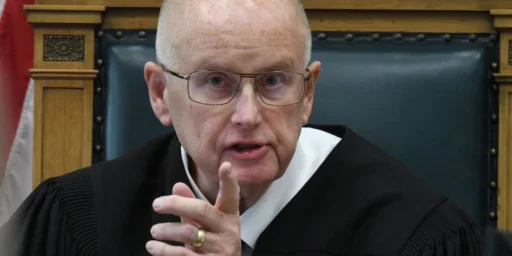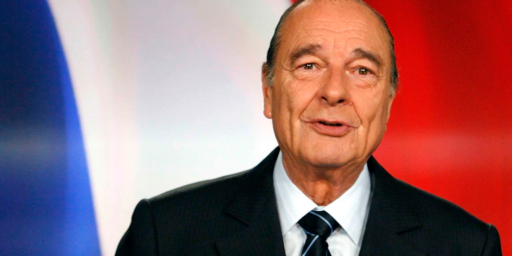Europe’s Fading Anti-Americans
UPI’s editor-in-chief Martin Walker, with whom I’ve had the pleasure of dining and consuming an adult beverage or two, has an interesting column in today’s Washington Times entitled, “Europe’s fading anti-Americans.”
Whoever wins the American presidential election this November (and polls, economic prospects and the unknown dangers of terrorism and Iraq make it too close to even think of calling), will have to deal with the fact that there has already been a fundamental changing of the guard in Europe.
The usual players of Britain’s Prime Minister Tony Blair, France’s President Jacques Chirac and German Chancellor Gerhard Schroeder remain in place, but the political dynamics of the European Union have shifted. Romano Prodi, the former Italian premier who has been president of the European Commission for the past five years is being replaced by Portugal’s center-right and pro-American premier Jose Manuel Barroso.
***
There was absolutely no support for Chirac’s fallback offering, the only French candidate, the new Foreign Minister Michel Barnier, who informed a recent high-level Transatlantic seminar: “What our American friends must understand is that we are going to build Europe not only as a market but as a power.” That raising of the old Gaullist flag of a Europe as “a counterweight” to the United States, which has been a feature of French diplomacy since the days of President Charles De Gaulle from 1958-1969, wins few salutes in the new Europe.
***
“It is stupid to see Europe as a counterweight,” Barroso insists. “In some European countries, there is the idea we’ll be independent if we are a counterweight. This is silly. It is a counterpart, not a counterweight.” “What is strategically intelligent in building an identity against the United States?” Barroso asks. Or responsible.”
***
Americans should bear in mind one last point when they consider the rather different EU that looks likely to emerge in the next few years. Germany’s Gerhard Schroeder faces re-election in the fall of 2006, and France’s Jacques Chirac faces re-election in the spring of 2007. There is a very strong prospect that the next U.S. president will see France and Germany under new management, free of the divisive baggage of recent years. It may be over-optimistic to suggest this, but the great Transatlantic crisis of the past two years may have already be over, with much fairer prospects ahead.
Walker, a Briton who spends a great deal of time in his summer home in France, is hardly a knee-jerk Bush supporter or foolish optimist. Not only is he very much in a position to grasp the pulse of European opinion but his argument strikes me as quite logical. The cost to Europe of constantly opposing US policy aims elsewhere would be enormous; the benefits, miniscule. Indeed, on almost all issues, our interests converge. Given the seemingly endless willingness of the US to shoulder the lion’s share of the financial costs of leadership, it only makes sense to get on the bandwagon most of the time.




